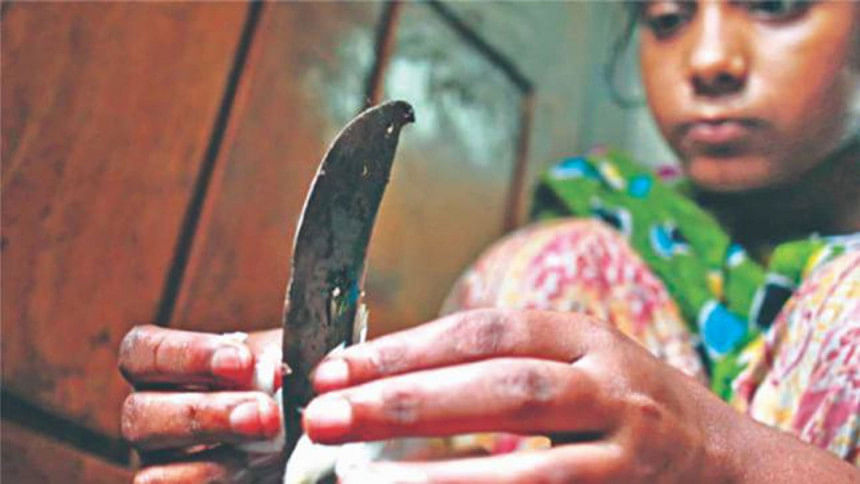Our disturbing apathy towards domestic worker abuse

There are certain topics which, when in the news, garner a lot of attention and opinions from varying perspectives. Sexual abuse and rape, financial scandals, the myriad shortcomings of government agencies—these are all matters of public interest that we all have something to say about, no matter which side of the "argument" we are on. So it is curious that the ghastly incidents of abuse and/or murder of a large section of working Bangladeshis (most of whom are minors and/or female) pass us by, practically unnoticed.
Take the story of 18-year-old Miyasa Akhter. She had been working as a domestic help at an Uttara residence in the capital for a year when, on June 9, her employer's (also the building owner) 27-year-old daughter scalded the young girl by pouring boiling rice foam on her. This resulted in Miyasa sustaining burn injuries to five percent of her body, according to a report by this daily. However, the culprit was not detained by police until June 11, and the detention only transpired because the doctor who had seen to Miyasa at Sheikh Hasina National Institute of Burn and Plastic Surgery had the good sense to report the incident through a 999 call. Prior to that, Miyasa was being "treated" at her employer's home for the sizeable burns on her back, neck and shoulder.
Naturally, you may wonder what happened next. Was Miyasa's employer charged? Will she be tried for her misdeed soon? Has the victim recovered, or been compensated? Is she finally safe from the possibility of further abuse? Unfortunately, as it often happens with cases of abuse against domestic workers, Miyasa's story, too, only earned one primary report and a resultant editorial piece in this newspaper, which rightly pointed out how, almost always, these cases "are not followed through because the employer has 'managed' the situation by paying some money to the victim or the victim's family who are poor and powerless".
Sadly, all of this—the abuse of domestic workers, the efforts to sweep their stories under the rug and the inevitably unjust ends to their stories—are common knowledge, not limited to any one strata of society.
But why is it so easy for employers to get away with abusing domestic workers?
From the get-go, the power structure between the employer and domestic worker is grossly unequal, with the employer having near total dominance and the worker having very little power. The employer always has the upper hand, while most people work in others' homes solely because they have no other option. Especially for families of young girls, working in a household is deemed to be the "safest" option as they believe their children would be working indoors with another family, will be fed and clothed, and will also be able to send money back to support them. This same vulnerability is also why these children make up a good chunk of the country's domestic worker population: because they are so accessible to exploitative employees who can abuse and deprive them, and for the most insignificant reasons, with impunity.
Then again, only a severely depraved person would be able to find a reason to justify confining a child in a house and abusing her for days on end, to the point of pouring hot water on her—as had happened to 10-year-old Asia in Dhaka's Rupnagar in July last year, at the hands of her two employers. The report of this incident in this newspaper ends with "Filing of a case is underway"—and that, as per usual, is the end of the story.
In 2015, after years of being pushed by rights organisations and activists, the government finally introduced and approved the Domestic Worker Protection and Welfare Policy 2015. This was the first ever policy to protect domestic workers and to have in place a framework of sorts for them. Of course, there are certain discrepancies within it. For instance, it states that the minimum age of a worker for doing "light works" is 14 and for "heavy works", it should be 18. However, it also states that in order to employ a 12-year-old child for domestic work, "the employer must negotiate the terms with a legal guardian of the child, under the presence of a third party witness".
Still, this policy could have provided some relief for domestic workers by way of the country's law recognising their right to earn a dignified livelihood—had it been implemented in any capacity. Almost six years after it was adopted by the government, the DWPWP 2015 remains largely unpracticed, while more and more children are being employed by employers who know they can get away with mistreating their domestic staff. The Labour Law of 2013 recognises domestic work as a valid profession, but only in the informal sector, which means that domestic workers are not entitled to any of the benefits availed to formal sector workers. Additionally, despite the disturbing prevalence of abuse in this sector where so many children are employed, domestic work was apparently not deemed to be dangerous enough to be included in the government's list of "38 processes/activities hazardous for children".
What is worse is that, due to the Covid-19 pandemic that hit Bangladesh in March 2020, children have been out of school for over a year. And those who belong to the poorest of families also have not had access to online educational resources. Of course, unemployment rose in most sectors and in order to help out their struggling families, children had to join the workforce in one way or another. Earlier this month, the International Labour Organization and UNICEF reported the first increase in global child labour in the last two decades, with 160 million children engaged in labour at an increase of 8.4 million since 2016. Of the 160 million child labourers, a staggering 79 million are engaged in categorically hazardous work. Prior to this, child labour had fallen by 94 million between 2000 to 2016, but with the progression of the pandemic, the two organisations have warned that millions of more children are at risk of being in child labour, including of course, domestic work.
Non-government organisations protesting against and creating awareness about domestic worker abuse can only bring about so much progress if the main stakeholders remain unaware or wilfully ignorant. At the grassroots level, families must be made aware of the real scenario for children engaged in domestic labour. However, it often happens that families of employees are aware of all the abuse but are forced to let it slide, either because they need the job to survive or because employers bribe them against taking any legal actions. But given how normalised the abuse of domestic workers is in our country, it is clear that only a strong stance against it by the government can begin to slow it down and eventually put a stop to it. A policy is in place already, which is the first step in the right direction. Now, it needs to have a proper set of guidelines for the minimum age requirement, wages, and working conditions of domestic workers. Above all, it has to be recognised by all that abusive employers of domestic workers can only go scot free if our society and the government allow them to. We must all realise how unfair and shameful it is to have such a collectively nonchalant attitude towards something as diabolical as the gross abuse (and, in many cases, murder) of human beings who only find themselves in abusive situations because they need to earn a living.
Afia Jahin is a member of the Editorial Team at The Daily Star.

 For all latest news, follow The Daily Star's Google News channel.
For all latest news, follow The Daily Star's Google News channel. 



Comments